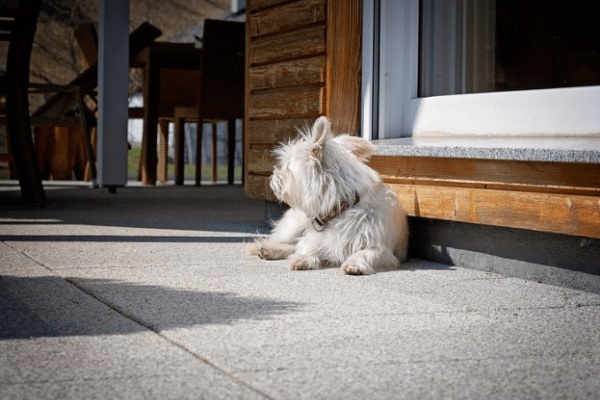Dog Not Eating While Owners On Vacation [7 Reasons & Fix]
![Dog Not Eating While Owners On Vacation [7 Reasons & Fix] Dog Not Eating While Owners On Vacation](https://petcreeks.com/wp-content/uploads/2023/02/Dog-Not-Eating-While-Owners-On-Vacation.jpg)
We’ve all been through it – that heart-wrenching moment when we have to leave our furry friends behind while we embark on a well-deserved vacation.
But have you ever noticed that your dog’s appetite seems to vanish when you’re away? Well, fret not!
In this short blog post, we’ll shed some light on why your pup might be giving their food the cold shoulder while you’re sipping margaritas on the beach.
Let’s dig in!
Dog Not Eating While Owners On Vacation
When a dog refuses to eat while their owners are on vacation, it could be due to a range of reasons. Firstly, dogs are creatures of routine, and their appetite may be affected by the sudden change in their environment or the absence of their familiar caregivers.
Additionally, dogs can experience separation anxiety, which can manifest as a loss of appetite. Lastly, if the dog is being cared for by someone unfamiliar or in an unfamiliar setting, they may feel stressed or anxious, leading to a decrease in appetite.
Let’s break it down further…
Reasons for Dog Not Eating While Owners On Vacation
The following are some of the most common reasons for dog not eating while owners on vacation:
1. Separation Anxiety
One major reason why a dog may not eat while their owners are on vacation is separation anxiety. Dogs with separation anxiety become extremely anxious and distressed when separated from their owners. They may exhibit behaviors such as vocalization, destruction, house soiling, restlessness, shaking, salivating, and refusing to eat. They often crave physical contact and attention from their owners.
How to fix it: To help alleviate separation anxiety, it is important to gradually desensitize the dog to departures and create a positive association with being alone. This can be done by practicing short departures and gradually increasing the duration over time. Providing the dog with interactive toys, puzzles, and treats can also help keep them occupied and distracted while alone. In severe cases, consulting with a professional dog trainer or behaviorist may be necessary.
2. Medical Issues
Another reason for a dog not eating while their owners are on vacation could be underlying medical issues. Dogs may experience various health problems that can affect their appetite, such as gastrointestinal issues, dental problems, pain, or illness.
How to fix it: If a dog’s lack of appetite persists or is accompanied by other concerning symptoms, it is important to consult a veterinarian for a thorough examination and appropriate medical treatment. The veterinarian can diagnose and address any underlying health issues that may be causing the dog’s decreased appetite.
3. Change in Routine
Dogs are creatures of habit, and any significant change in their routine, such as their owners going on vacation, can disrupt their eating patterns. Dogs may feel stressed or anxious due to the change in their environment and the absence of their owners, leading to a loss of appetite.
How to fix it: Maintaining a consistent routine as much as possible can help alleviate a dog’s stress and encourage them to eat. This includes feeding them at the same times each day and providing familiar surroundings and objects, such as their bed or toys. Additionally, leaving a piece of clothing with the owner’s scent can provide comfort and reassurance to the dog.
Read more about dogs not eating but guarding food.
4. Environmental Factors
The dog’s environment may also play a role in their decreased appetite while their owners are on vacation. Factors such as a new pet sitter, unfamiliar surroundings, or changes in feeding location can cause stress and anxiety, leading to a loss of appetite.
How to fix it: Introducing the pet sitter to the dog before the vacation and allowing them to spend some time together can help familiarize the dog with the new person. Providing the dog with a comfortable and familiar feeding area can also help them feel more at ease. Gradually transitioning to a new environment or maintaining some elements of the dog’s usual environment, such as their bed or toys, can also help reduce stress.
5. Travel Anxiety
Some dogs may experience travel anxiety when going on vacation with their owners. The stress and motion sickness associated with traveling can cause a dog to lose their appetite.
How to fix it: Gradually acclimating the dog to car rides and providing them with a comfortable and secure space, such as a crate or a seat belt harness, can help reduce travel anxiety. Additionally, feeding the dog a light meal a few hours before traveling and avoiding feeding them immediately before or during the journey can help prevent motion sickness.
Read more about dogs hiding and not eating.
6. Food Changes
If the dog’s diet is changed abruptly while their owners are on vacation, it can lead to a loss of appetite. Dogs may be hesitant to eat unfamiliar or new types of food.
How to fix it: If a change in diet is necessary, it is important to gradually transition the dog to the new food by mixing it with their current food over a period of several days. This allows the dog to become accustomed to the new food gradually. Additionally, ensuring that the dog’s food is stored properly and remains fresh can help maintain its palatability.
7. Emotional Distress
Dogs are sensitive animals and can experience emotional distress when their owners are away. They may feel lonely, anxious, or depressed, which can lead to a loss of appetite.
How to fix it: Providing the dog with companionship and mental stimulation in the form of interactive toys, puzzles, or playtime with a pet sitter can help alleviate their emotional distress. Maintaining a consistent routine and ensuring that the dog receives plenty of exercise and attention can also help improve their appetite.
How to Encourage Dogs to Eat Properly While Their Owners Are on Vacation
Leaving our furry friends behind when going on vacation can be a challenge for pet owners. One common concern is ensuring that our beloved dogs continue to eat properly in our absence.
To address this, here are some practical approaches to encourage dogs to maintain a healthy eating routine while their owners are on vacation:
1. Seek Assistance from a Trusted Pet Sitter: Hiring a trusted pet sitter is an excellent way to ensure that your dog’s eating routine is maintained. A familiar face can provide comfort and reassurance to your dog while you’re away. Instruct the pet sitter on your dog’s feeding schedule, portion sizes, and any specific dietary requirements. Regular communication with the pet sitter can help address any concerns or adjustments that may be needed.
2. Familiarize the dog with the caretaker: Before the owner leaves, it is essential to introduce the dog to the caretaker who will be responsible for feeding them. This helps build trust and familiarity, making it easier for the dog to accept food from someone other than their owner.
3. Establish a Consistent Feeding Schedule: Before your departure, establish a consistent feeding schedule for your dog. Dogs thrive on routine, and knowing when their meals will be served can help them feel more secure. Stick to the same schedule they are accustomed to, ensuring that their breakfast, lunch, and dinner times remain consistent.
4. Use Interactive Food Dispensing Toys: Interactive food dispensing toys, such as puzzle feeders or treat balls, can engage your dog’s natural instincts and make mealtime more exciting. These toys require your dog to work for their food, providing mental stimulation and encouraging them to eat. Fill the toy with their regular kibble or treats and introduce it a few days before your departure to help them associate it with positive experiences.
5. Maintain a Calm and Stress-Free Environment: Dogs are sensitive to their surroundings, and a calm and stress-free environment can help them feel at ease during mealtime. Ensure that their feeding area is quiet and free from distractions. If necessary, consider using white noise or calming music to create a soothing atmosphere.
6. Use The Owner’s Scent: Dogs have a strong sense of smell, and the scent of their owner can provide them with comfort and reassurance. Placing an unwashed t-shirt or a blanket with the owner’s scent near the dog’s food bowl can help stimulate their appetite.
7. Offer High-Value and Tasty Treats: If your dog is particularly reluctant to eat while you’re away, try offering high-value treats or food to entice them. This could include small pieces of cooked chicken, freeze-dried liver, or other tasty and healthy options. However, be cautious not to overdo it, as sudden changes in diet can upset their digestion.
8. Warm Up The Food: Warming up the dog’s food slightly can enhance its aroma, making it more enticing for them. However, it is important to ensure that the food is not too hot, as dogs have sensitive mouths. A few seconds in the microwave or adding warm water to the kibble can help increase the food’s appeal.
9. Maintain Contact through Video Calls: Thanks to modern technology, it is now possible to maintain contact with your dog through video calls. Set up a video call with your pet sitter and have them interact with your dog during mealtime. Seeing and hearing your voice can provide comfort and encouragement for your dog to eat.
10. Consult with a Veterinarian: If your dog consistently refuses to eat while you’re away, it may be worth consulting with a veterinarian. They can assess your dog’s overall health and determine if there are any underlying medical conditions contributing to their decreased appetite. The veterinarian may provide additional recommendations or prescribe appetite-stimulating medications if necessary.
By implementing these practical approaches, dog owners can encourage their pets to eat properly while they are on vacation. Remember, it’s essential to prioritize the dog’s comfort, routine, and well-being during this time.
Read more about dogs not eating and throwing up.
Frequently Asked Questions
Why is my dog not eating while I’m on vacation?
Dogs can experience changes in their eating habits when their owners are away. The stress of your absence, combined with a change in routine, can lead to a decrease in appetite. Additionally, some dogs may also experience separation anxiety, which can further affect their eating patterns.
Should I be worried if my dog isn’t eating while I’m on vacation?
While it’s normal for dogs to have a decreased appetite when their owners are away, it’s essential to monitor their overall health. If your dog refuses to eat for an extended period or shows other concerning symptoms, such as lethargy or vomiting, it’s best to consult a veterinarian to rule out any underlying health issues.
How can I encourage my dog to eat while I’m on vacation?
There are a few things you can try to entice your dog to eat. First, make sure they have access to fresh water at all times. You can also try offering them small, frequent meals instead of their regular portions. Adding some warm water or low-sodium chicken broth to their food can make it more appetizing. Additionally, leaving familiar scents, such as an unwashed t-shirt, near their food bowl can provide comfort and encourage them to eat.
Should I consider hiring a pet sitter to address my dog’s eating issues?
Hiring a pet sitter can be a great solution to ensure your dog’s well-being while you’re on vacation. A trusted pet sitter can provide companionship, maintain your dog’s routine, and keep a close eye on their eating habits. They can also offer reassurance and help alleviate any separation anxiety your dog may be experiencing.
Can a sudden change in diet cause my dog to stop eating while I’m on vacation?
Yes, a sudden change in diet can lead to a loss of appetite in dogs. If you’ve recently switched your dog’s food or treats, they may need some time to adjust. During your vacation, it’s best to stick to their regular diet and avoid introducing any new foods. This will help maintain their routine and minimize any potential eating issues.
How long can a dog go without eating before it becomes a concern?
Dogs can go a few days without eating before it becomes a significant concern. However, every dog is different, and it’s essential to monitor their behavior closely. If your dog shows signs of distress, appears weak, or refuses to eat for an extended period, it’s crucial to seek veterinary attention promptly. A veterinarian can determine the underlying cause and provide appropriate treatment.
Conclusion
In conclusion, when it comes to your dog not eating while you’re on vacation, remember that it’s completely normal for them to experience some appetite changes due to stress and anxiety.
However, with proper preparation and the help of a trusted pet sitter or boarding facility, you can ensure that your furry friend stays happy, healthy, and well-fed even in your absence. So, don’t fret, enjoy your vacation knowing that your pup is in good hands!





![Do Beagles Shed [9 Reasons They Shed] Do Beagles Shed](https://petcreeks.com/wp-content/uploads/2023/04/Do-Beagles-Shed-768x555.jpg)
